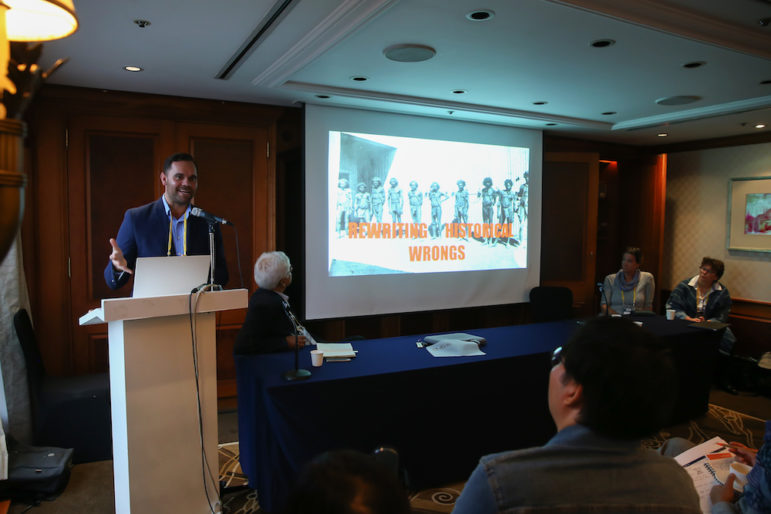
Rewriting Historical Wrongs: Allan Clarke, an investigative reporter and producer for the Australian Broadcasting Corporation, spoke about investigating an unsolved murder case in Australia involving the suspicious death of a teenage Aboriginal boy.
When it came to reporting on the Nepalese Civil War, Nepali Times editor Kunda Dixit said he quickly un-learned what he was taught in journalism school about being an objective observer.
“I’ve been accused of crossing the line,” Dixit said during a panel on war crimes and historical trauma during the Uncovering Asia conference in Seoul on Friday. “Objectivity is not what we should aspire for, but instead fairness. Being fair would be trying to move toward justice.”
During this civil war, more than 17,000 people were killed and nearly 1,300 are still missing. Dixit didn’t think the civilians got the attention they deserved so he called for photograph submissions from the public. More than 3,000 photos were sent for consideration. In 2006, about seven months after the war ended, Dixit published a book of civilian photos called A People War: Images of the Nepal Conflict 1996-2006.
“The intensity of feeling which people looked at the photographs had a cathartic effect,” Dixit said. “It helped with the healing process.” The book sold well so Dixit decided to take the photos on a cross-country tour, exhibiting them amidst the ruin and rubble left by the war. More than 500,000 visitors came to the exhibition, which was taken to 45 of the country’s 75 districts.
Dixit was joined on the panel by Martha Mendoza, the two-time Pulitzer prize-winning journalist and reporter for the Associated Press, who reported on war crimes in many countries, including Korea, Mexico and Panama. Mendoza agreed that traditional objectivity is not possible when reporting these kinds of stories.
“When you run into stories about war crimes and historical trauma, like it or not you get involved,” Mendoza said.
Mendoza spoke about her reporting on the the hundreds of Korean civilians that were slaughtered at the No Gun Ri bridge by American soldiers early in the Korean War.
Crossing the Line
Allan Clarke, investigative reporter and producer for the Australian Broadcasting Corporation, also spoke about his close connection with both his sources and the topic. For the past five years, Clarke has been investigating an unsolved murder case in Australia involving the suspicious death of a teenage aboriginal boy named Mark.
“I started this work almost detached from what I was reporting, but at some point I crossed the line,” Clarke said. “I had a lot of editors tell me I was too close to report objectively.”
As an aboriginal person himself, Clarke knew he wanted to give voice to a marginalized people that were often discriminated against. Clarke realized how personally invested he was in both the family and the investigation, but he argued that’s what was driving him to get the story done.
For each of these panelists, sources were willing to share their stories even though it meant dredging up horrific memories; many war survivors in Nepal, the aboriginal family who lost a loved one and the scarred victims in Korea came forward. These types of stories often re-shape the relationship between reporter and source.
“I wouldn’t tell a story if someone asked me not to tell it,” Clarke said when asked about interviewing members of aboriginal communities. “For me, it’s nothing about them without them.”
Mendoza assures her sources that they won’t lose control of their narrative. She reminds them it’s not her story.
When Mendoza’s exposé on the American troops was published in 1999, there was public outcry, a joint US and South Korean investigation and global acknowledgment of the atrocity.
Sitting in the audience in Seoul was a son of one of the Korean survivors. Mendoza thanked him for being there and told the audience how momentous it felt to talk about this investigation in South Korea, the location of the war crime.
Looking at the other two panelists, Mendoza said, “As you both know, this is not just a story for me anymore.”

Mariel Padilla is a data and investigative fellow at Columbia University’s Graduate School of Journalism. Her work has been published in USA Today, Patch.com, FilAm Magazine, The Philippine Daily Inquirer and The Cincinnati Enquirer, where she contributed to the Pulitzer-prize winning project: “Seven Days of Heroin.”
